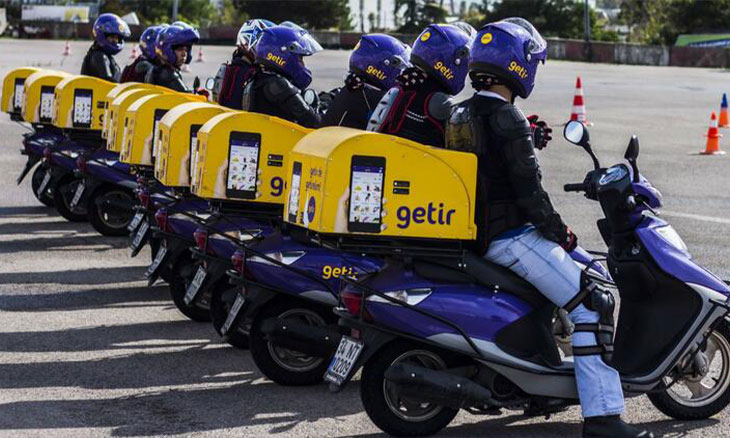Getir, the Istanbul-based grocery delivery app, has raised $550m in new funding — tripling its valuation to $7.5bn, including the new capital, barely three months after its last financing.
The deal means that seven-year-old Getir, which only began to expand outside Turkey in January and is now planning a US launch this year, is worth more than food delivery apps Deliveroo and Grubhub, as well as UK supermarkets WM Morrison and Marks and Spencer.
Investors are piling into the latest ecommerce trend of rapid grocery delivery. Getir pioneered the concept of offering convenience-store items in as little as 10 minutes in Turkey several years ago but a slew of copycats have emerged over the past year, fueled by coronavirus lockdowns.
“The reason we raised so frequently is because we decided to go to the US this year rather than later,” said Nazım Salur, Getir’s chief executive. “Suddenly a lot of clones are popping up everywhere. If we don’t take care of business, others will.”
The latest round takes Getir’s total funding in the past four months to almost $1bn.
DisruptAD and Mubadala Investment Company, which are both arms of Abu Dhabi sovereign wealth funds, as well as Silicon Valley-based fund Silver Lake, are joining Getir as new investors, alongside existing backers Tiger Global and Sequoia Capital.
Getir has opened 28 delivery hubs in London and plans to expand in Amsterdam, Paris and Berlin.
In March Gopuff, the US-based delivery app offering “immediate everyday needs”, raised $1.2bn at a valuation of nearly $9bn from investors including SoftBank Vision Fund and D1 Capital, to fuel its expansion into Europe. Getir’s European rivals Gorillas and Flink are also reported to be fundraising again, just months after their last rounds.
Despite warnings from food delivery veterans that the rapid-delivery model remains unproven and unprofitable, its investors are excited by unprecedented growth rates. Getir, which has now opened 28 delivery hubs in London and plans to expand in Amsterdam, Paris and Berlin this month, increased revenues fivefold last year and is likely to do so again in 2021, according to Salur.
Getir hopes to launch in three large US cities later this year, with more to follow in 2021.
Defying the many sceptics surrounding his nascent industry, Salur insists that Getir’s business model can work “wherever there is pizza delivered”. He predicts that in less than 10 years, more than half of grocery ordering in many countries will go online.
Salur is also confident that today’s approach of booking delivery slots days in advance, as traditional supermarkets and grocery delivery pioneers such as Ocado typically offer, will soon be eclipsed by Getir’s model of hundreds of “dark stores” and electric mopeds.
“Scheduled delivery is BlackBerry,” said Salur. “We are the iPhone.”
Nazim Salur, chief executive of Getir, believes that the company can replicate its European success in the US.
Salur, now 59, is one of Getir’s five co-founders. He worked in furniture production and then as a real estate broker for used industrial plants before launching his first start-up, the Turkish taxi-hailing app BiTaksi, in 2013.
After BiTaksi consistently hit Salur’s target of three-minute wait times, in late 2014 he came up with the idea of delivering a limited selection of groceries to customers in 10 minutes.
“Ten minutes is almost now,” he said. “It’s a different thing, it creates its own customer base.”
At the time, even the fastest ecommerce services took at least 30 minutes and as long as a few days to arrive. But when Salur canvassed his friends on the 10-minute concept, they dismissed it as unnecessary or unviable.
“We came up with the idea when everybody thought this was a silly idea,” Salur said. “We believed in it, put in blood and tears for many years. Now so many are putting money after it.”
Despite the sudden influx of capital, Salur insists Getir will spend it prudently. “We are not a spoilt Silicon Valley start-up with lots of money to trash away,” he said.
While Getir’s service may appear straightforward to consumers — offering a limited selection of around 1,500 items from “micro-fulfilment centres” dotted around the city — Salur insists it is hard to replicate.
“There are at least a couple of thousand details to our business and the clones think there is a couple of hundred,” he said. “We have the most knowledge and the most data.”
In its home market of Turkey, where it now has almost 500 dark stores in 30 cities, Getir has already expanded to deliver a greater selection from larger warehouses — albeit in more than 10 minutes — and hot meals.
“We are a long-term grocery play,” said Salur. “We [will] win the hearts and minds of people with 10 minutes, get under your skin, and then later if people need more from us we can diversify our offerings.”
Source: ft.com
